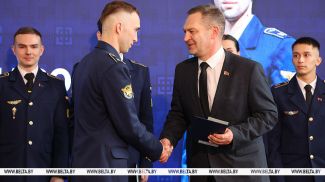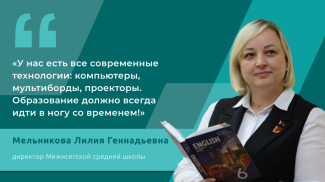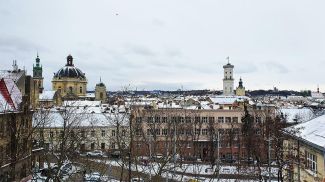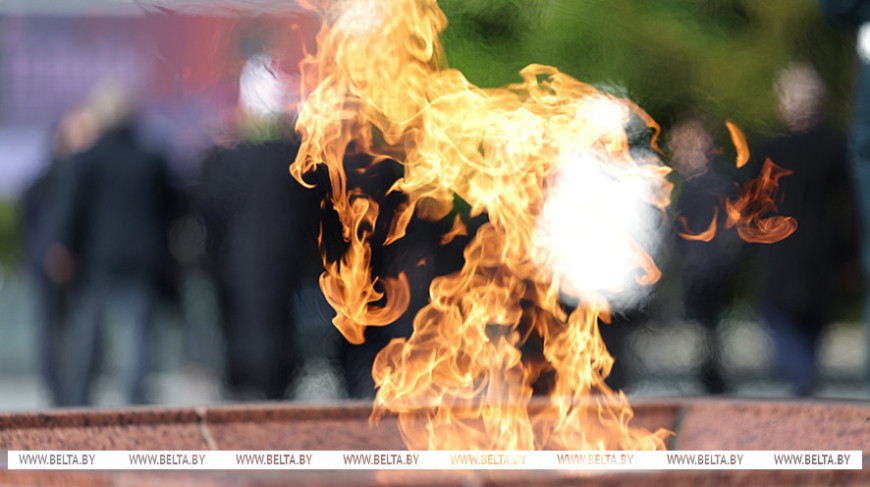
News of the story
"Victory Parade: Stories and Faces"
In December 1944, during the crossing of the Danube River, Stepan Pashkevich’s unit was ordered to ensure the transportation of the Soviet troops. Together with his soldiers, on a hastily assembled ferry, he made seven trips - an unprecedented feat, considering that the enemy had sent dozens of aircraft to the area. For two days, our fellow countryman worked without sleep or rest but accomplished the mission. For this heroic act, the sergeant was awarded the highest distinction—the title of Hero of the Soviet Union.
Feat at the ferry crossing
Like most veterans of the Great Patriotic War, Stepan Pashkevich rarely spoke about the war. Even his children heard only fragments of the story behind the heroic act that earned him the title of Hero of the Soviet Union.
"Dad was always a physically strong man. But once, I remember, he caught a cold. He was almost 70 by then. And he said this: 'Back there, on the Danube, we spent several days in icy water. Frost and snow everywhere, but I didn’t even get a runny nose. And here, in the warmth, I caught a cold,'" his daughter Svetlana recalled.
From such fragments and short stories, the veteran’s family pieced together a broader picture of what he endured during the war. Stepan Pashkevich was drafted into the Red Army in 1940. He served in the 7th Independent Motorized Pontoon-Bridge Battalion of the 1st Pontoon-Bridge Brigade, 46th Army of the Odessa Military District, which was responsible for ensuring troop crossings across water obstacles. His unit was stationed in the city of Soroki in the Moldavian SSR.
“Dad recalled that on the eve of 22 June 1941, the weather was beautiful, and soldiers were playing volleyball. Everything around was peaceful and calm. That day, my father had a politics class. When they were briefed on the latest events, one of his comrades suddenly asked, 'So what happens next?'. And Dad replied, 'War. That’s what.' But none of the soldiers in that classroom could have imagined it would begin in just a few hours," his daughter said.
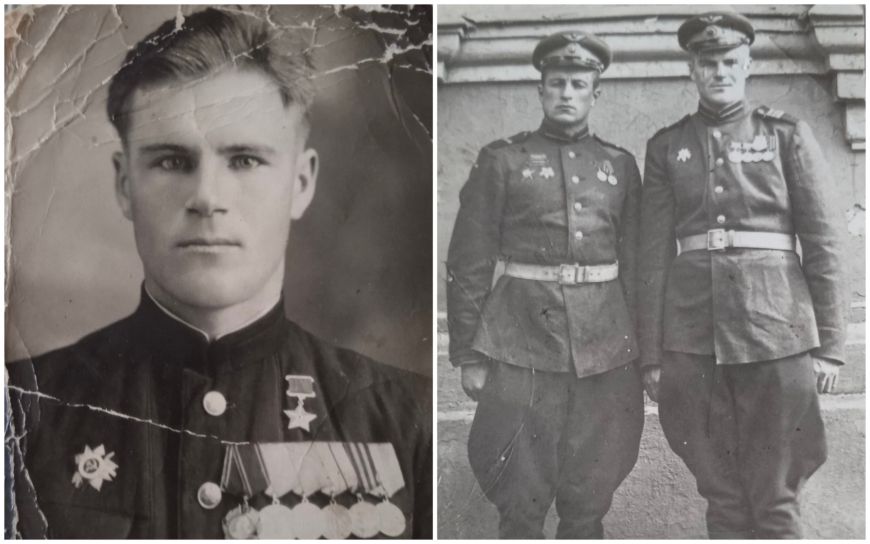
Feat at the ferry crossing
Like most veterans of the Great Patriotic War, Stepan Pashkevich rarely spoke about the war. Even his children heard only fragments of the story behind the heroic act that earned him the title of Hero of the Soviet Union.
"Dad was always a physically strong man. But once, I remember, he caught a cold. He was almost 70 by then. And he said this: 'Back there, on the Danube, we spent several days in icy water. Frost and snow everywhere, but I didn’t even get a runny nose. And here, in the warmth, I caught a cold,'" his daughter Svetlana recalled.
From such fragments and short stories, the veteran’s family pieced together a broader picture of what he endured during the war. Stepan Pashkevich was drafted into the Red Army in 1940. He served in the 7th Independent Motorized Pontoon-Bridge Battalion of the 1st Pontoon-Bridge Brigade, 46th Army of the Odessa Military District, which was responsible for ensuring troop crossings across water obstacles. His unit was stationed in the city of Soroki in the Moldavian SSR.
“Dad recalled that on the eve of 22 June 1941, the weather was beautiful, and soldiers were playing volleyball. Everything around was peaceful and calm. That day, my father had a politics class. When they were briefed on the latest events, one of his comrades suddenly asked, 'So what happens next?'. And Dad replied, 'War. That’s what.' But none of the soldiers in that classroom could have imagined it would begin in just a few hours," his daughter said.

Stepan Pashkevich went to war on the very first day - 22 June 1941. He fought in nearly every major battle of the Great Patriotic War: he participated in defensive operations in Moldova and southern Ukraine, in the Donbass and the Don River region, the Battles of Stalingrad and Kursk, the Battle of the Dnieper. He also helped liberate Ukraine, Moldova, Romania, Hungary, Czechoslovakia, Yugoslavia, and Austria. One of his first awards, the Combat Merit Medal, was bestowed upon the Red Army soldier on 29 September 1942. That day, a ferry loaded with a heavy gun, a tractor, and a truck was trying to reach a new crossing point over the Seversky Donets River under enemy mortar and machine-gun fire. Stepan Pashkevich was assigned to assist the motorists on the ferry.
And then, enemy aircraft began attacking the crossing, aiming straight at the ferry! The helmsman sharply changed course, trying to steer the ferry away from bombs, when he suddenly fell dead. Stepan Pashkevich rushed to the helmsman’s assistant, who was supposed to take the wheel, but the damaged ferry began to sink. Only by a miracle did they manage to reach the shallows and immediately rushed to help their comrades. Risking his life, Stepan Pashkevich personally carried out the severely wounded under fire. And when, a little later, the company received the task of blowing up the high-water bridge, Stepan Pashkevich volunteered to go with the demolition team. Despite the fact that enemy patrols were heavily guarding this area and even illuminating the river with flares, our hero managed to outwit them and silently attach the charges. By dawn, the mission was accomplished.
Junior Sergeant Pashkevich was awarded the Order of the Patriotic War 2nd Class for his assistance to Soviet troops at the Bahlui River on 21 August 1944. The enemy had established strong defenses on the heights there, protecting the city of Iași from the flank. With nightfall, it became necessary to get tanks across a swampy bog to support the infantry. To make this happen, Stepan Pashkevich and his squad built a bridge working under machine gun fire. As a result, at dawn, 242 tanks broke through, ultimately deciding the outcome of the battle for Iași.
Breakthrough at the Danube River
The crossing of the Danube River proved to be one of the most terrible ordeals our hero had to endure. The infantry had not even reached the enemy shore yet, but he and his squad had already begun assembling a ferry. As soon as it was ready, Stepan Pashkevich and fellow soldiers began transporting troops. They dodged enemy fire as best they could. But the enemy still managed to breach the right pontoon. And then, without hesitation, the sergeant began patching the hole.
“Dad told me that this all happened in the middle of the river, so he immediately rushed to repair it,” said Svetlana Stepanovna. “They pushed that ferry with their hands. It’s hard to even imagine how it all was being done, given the December frost and the river’s strong current, which was a kilometer wide. Moreover, the Germans were doing their utmost to destroy them; the shelling was tremendous. He said they bombed so intensely that the water boiled around them.”
The damage was patched up, and the ferry successfully approached the shore, but suddenly a new misfortune: machine gunners, entrenched in the walls of a brick factory, prevented it from docking. Stepan Pashkevich, along with the infantry, decided to cover the remaining distance by wading through the water, returning fire on the move.
“There was no order to engage in battle. But how could you not engage when they were shooting at him and his soldiers? That's why my father went on the attack,” the veteran's daughter says.
Soon, the entire enemy group was destroyed. Sergeant Pashkevich prepared the moorings, and the artillery and personnel were successfully unloaded on the right bank of the Danube. Thanks to Stepan Pashkevich, seven trips were made! Command documents recorded that he went without sleep or rest for two nights and two days, continuing to ferry reinforcements even when dozens of enemy aircraft raided. His squad defeated the enemy defenses, but the commander lost half of his soldiers that day. For the heroism displayed during the crossing of the Danube, Sergeant Pashkevich was awarded the highest distinction - the title of Hero of the Soviet Union.
"The Victory Parade is impossible to forget"
Stepan Pashkevich was in Czechoslovakia when the war ended. It was from there that he was sent to participate in the Victory Parade in Moscow. In one of his last interviews, the veteran recalled that only two men from his entire unit were delegated to go: himself and Stepan Bogomolov, also a Hero of the Soviet Union, who had distinguished himself during the crossing of the Dnieper River. The journey took approximately three days - first in freight cars, then in sanitary wagons. At one of the border stations, local residents, upon seeing the soldiers, began shouting with joy, kissing and hugging them. Everyone was trying to find out if they had encountered their relatives who had gone to the front.
Soon, the entire enemy group was destroyed. Sergeant Pashkevich prepared the moorings, and the artillery and personnel were successfully unloaded on the right bank of the Danube. Thanks to Stepan Pashkevich, seven trips were made! Command documents recorded that he went without sleep or rest for two nights and two days, continuing to ferry reinforcements even when dozens of enemy aircraft raided. His squad defeated the enemy defenses, but the commander lost half of his soldiers that day. For the heroism displayed during the crossing of the Danube, Sergeant Pashkevich was awarded the highest distinction - the title of Hero of the Soviet Union.
"The Victory Parade is impossible to forget"
Stepan Pashkevich was in Czechoslovakia when the war ended. It was from there that he was sent to participate in the Victory Parade in Moscow. In one of his last interviews, the veteran recalled that only two men from his entire unit were delegated to go: himself and Stepan Bogomolov, also a Hero of the Soviet Union, who had distinguished himself during the crossing of the Dnieper River. The journey took approximately three days - first in freight cars, then in sanitary wagons. At one of the border stations, local residents, upon seeing the soldiers, began shouting with joy, kissing and hugging them. Everyone was trying to find out if they had encountered their relatives who had gone to the front.
The preparations and rehearsals lasted for almost a month.
“The Victory Parade is impossible to forget,” the war veteran admitted. “It is a historic event! When I was standing in formation on Red Square opposite the government tribune, I even saw Stalin.”
Decades later, Stepan Pashkevich also took part in two more anniversary parades on Red Square. Thanks to these events, in 1975, he attended a speech by Leonid Brezhnev at the State Kremlin Palace, and in 1985, he was a guest at a reception for veterans hosted by Mikhail Gorbachev.
If you are a relative or friend of a frontline soldier who took part in the Victory Parade on Red Square, Moscow, in June 1945 and you are willing to share your family story and photos with us, please call +375 17 311-33-17 or send an e-mail to ygavrilenko@belta.by. Let's tell the story of our Victors together!
Yulia GAVRILENKO,
7 Days newspaper
Photos courtesy of Stepan Pashkevich's family
“The Victory Parade is impossible to forget,” the war veteran admitted. “It is a historic event! When I was standing in formation on Red Square opposite the government tribune, I even saw Stalin.”
Decades later, Stepan Pashkevich also took part in two more anniversary parades on Red Square. Thanks to these events, in 1975, he attended a speech by Leonid Brezhnev at the State Kremlin Palace, and in 1985, he was a guest at a reception for veterans hosted by Mikhail Gorbachev.
If you are a relative or friend of a frontline soldier who took part in the Victory Parade on Red Square, Moscow, in June 1945 and you are willing to share your family story and photos with us, please call +375 17 311-33-17 or send an e-mail to ygavrilenko@belta.by. Let's tell the story of our Victors together!
Yulia GAVRILENKO,
7 Days newspaper
Photos courtesy of Stepan Pashkevich's family




